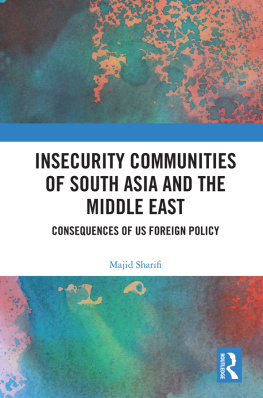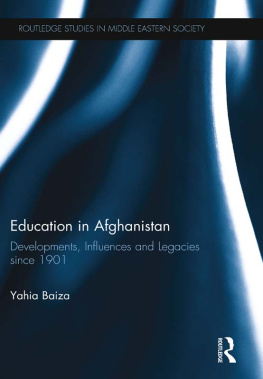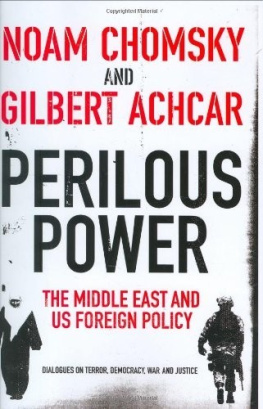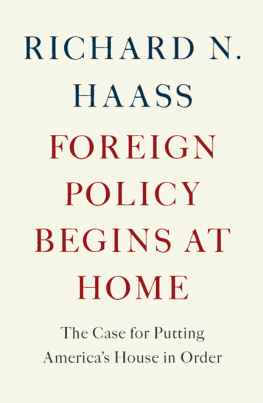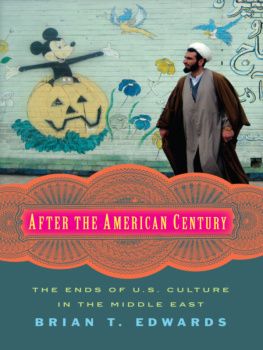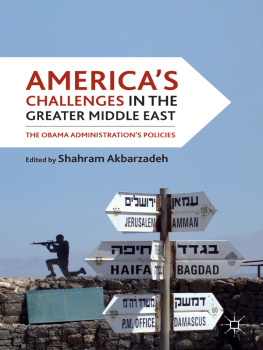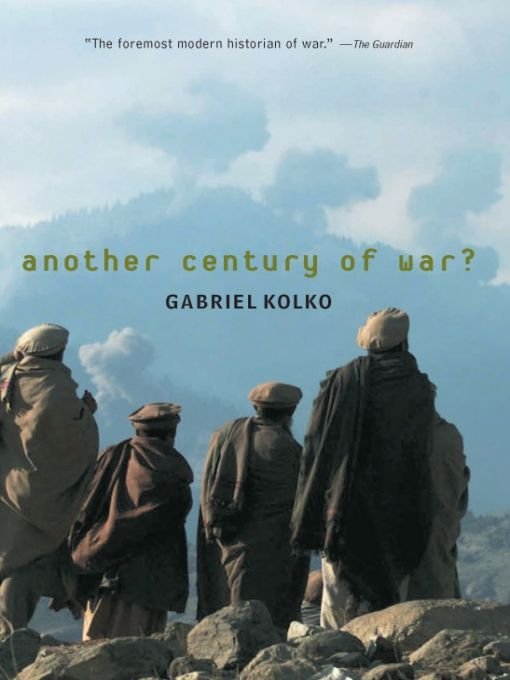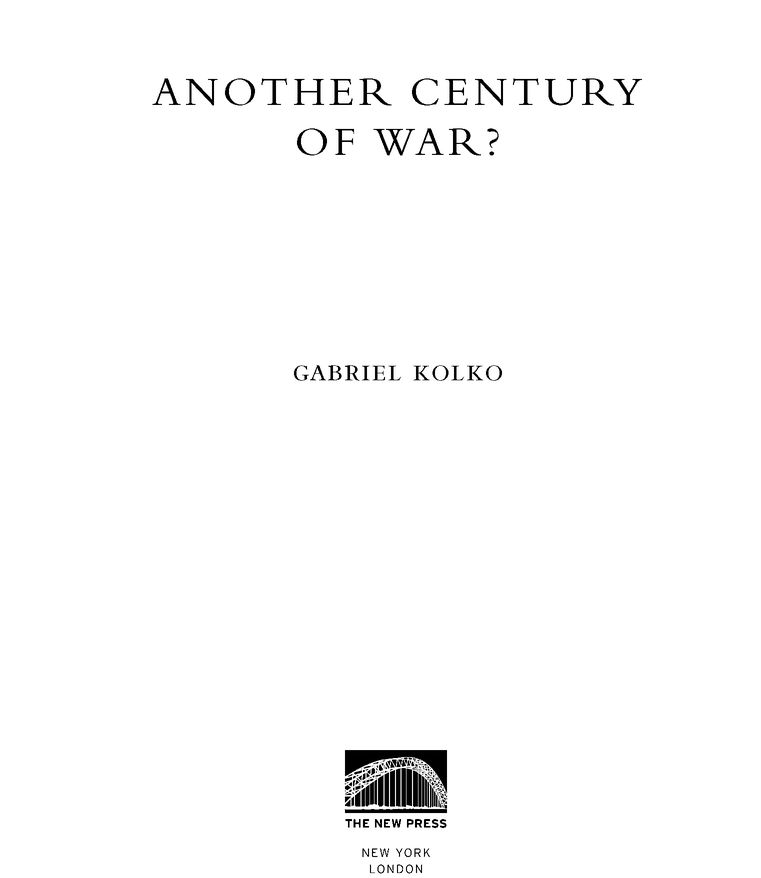Table of Contents
ALSO BY GABRIEL KOLKO
Vietnam: Anatomy of a Peace
Century of War: Politics, Conflicts, and Society Since 1914
Confronting the Third World: United States Foreign Policy, 19451980
Anatomy of a War: Vietnam, the United States, and the Modern Historical Experience
Main Currents in Modern American History
The Limits of Power: The World and United States Foreign Policy, 19451954 (coauthored with Joyce Kolko)
The Roots of American Foreign Policy
The Politics of War: The World and United States Foreign Policy, 19431945
Railroads and Regulation, 18771916 (Transportation History Prize, Organization of American Historians)
The Triumph of Conservatism: A Reinterpretation of American History, 19001916
Wealth and Power in America: An Analysis of Social Class and Income Distribution
To Joyce
PREFACE
In 1994 I published Century of War, which dealt with nations of the world that had been approximately equal in military power but also had the ambition to dominate other countries. The period after 1914 was incredibly destructive, but there was also a rough symmetry of might that created some decades of tense armed standoff, intervals of peace that led inevitably to more bloody wars. The situation over the past decade has changed radically, and no nation can match the United States military power. But its arms have not brought peace to the world even though Communism has virtually disappeared and can no longer serve to explain the behavior of the United States and its allies.
The world has become far more complex, and much more unstable politically. The Cold War is over, but the dangers and reality of wars are ever present. There are, especially, more civil wars. Weapons of every sort are more destructive and also more widely distributed. The tragic events of September 11, 2001, seemingly brought all of these disturbing factors to a climax for the first time within the United States. There were tangible reasons why they occurredand why we now live in an era of growing insecurity that will very probably see more traumas like them as well as responses like those they evoked. In the following pages I outline some of the causes for the events of September 11 and why Americas foreign policies not only have failed to exploit Communisms demise but have become both more destabilizing and more counterproductive. I also try to answer the crucial question posed in my title: Will there be another century of war?
The United States is now the sole nation with the ambition and presumably the military power and economic resources to rearrange the political destinies of states in whatever corner of the world it chooses to intervene. But this is a recipe for failure, and for more wars. Now we know that the destructive consequences of this foreign policy will reach Americas very shores in ways that were unthinkable over the past century.
The United States has won the war against the Taliban in Afghanistan militarily; if the Taliban regroup and fight a guerrilla war, then what follows is even more relevant, but that is not likely to be Americas concern. Then what is? Superficially, the crisis in Afghanistan may end for a period whose duration no one can predict, although the country will once again be so destabilized politically that it is very likely to reemerge as a problem for outside powersabove all, its neighbors. But Afghanistan is not a very important country. Indeed, it is a nation in name only, patched together by the British during their imperial heyday. There will be far more significant crises elsewhere, including civil wars and wars between states for which the United States has scant responsibility and in which it will play little role, if any. Such conflicts are the inevitable consequences of weapons becoming more freely available, and here the United States, the single most important arms exporter, is contributing to much of the future disorder that the world is likely to experience. But this book deals only with the United States past and future activities, because the principal (but surely not exclusive) danger the entire world confronts is Americas capacity and readiness to intervene virtually anywhere. After Afghanistan there will be more American military adventures. Ultimately the challenge is not Osama bin Laden and Muslim fundamentalismthat is more a symptom than a cause. It will not disappear until there are great changes not just in the Middle East but throughout the world, including within the United States itself. Such transformations will take decades, if they occur at all.
Technologically sophisticated American military power, which has won all the battles in Afghanistan, has only emboldened the Bush administration to use its might elsewhere. However, military success bears scant relationship to political solutions that end wars and greatly reduce the risk of their recurring. But this dichotomy between military power and political success has existed for most of the past century. The United States has always been ready to use its superior military strength even though employing that power often creates many more problems than it solves. Frequently, as Vietnam proved, unsustainable military establishments themselves become the source of Americas defeats.
The United States has avenged September 11, which is the principal reason it went into Afghanistan, but the vast region from South Asia to the Persian Gulf has been shaken profoundly in the process. The region will doubtless confront these aftershocks. America may well intervene elsewhere in its futile, never-ending quest to use its military power to resolve political and social instabilities that challenge its interests as it defines them. The questions we must confront are the premises as well as the consequences of American foreign policy since the early 1950s. Such larger issues are not dependent on immediate changes that are likely to occur between the time this is written and the publication datefor example, in Indian-Pakistani relations or the permanent crisis between Israel and Palestine.
Andr Schiffrin of The New Press suggested this book to me shortly after September 11s tragic events, and while I absolve him of all responsibility for the views expressed herethey are wholly my ownI do want to thank him profusely for proposing it. I have reflected on, researched, and written about these issues since the late 1950salmost a decade after I first met Andrwhen I was a graduate student at Harvard and debated many of these questions with the men who went on to get the United States more and more deeply into war in Vietnam, a war it lost after years of anguish and destruction. These same men subsequently helped manage American foreign policy. I am well aware of the myopia, hubris, and ambition of those responsible for some of the events described here. If nothing else, Harvard transformed me into a critic of the United States world role.
This book is dedicated to Joyce, my indispensable friend, whose companionship, stimulation, and encouragement has made everything possible.
INTRODUCTION
On September 19, 2002, President George W. Bush proclaimed the United States commitment to fighting preemptive wars, unilaterally if necessary, against rogue states that have weapons of mass destruction or harbor terrorists. In fact, this new era in international relations, with momentous implications for war and world peace, began long before then.



